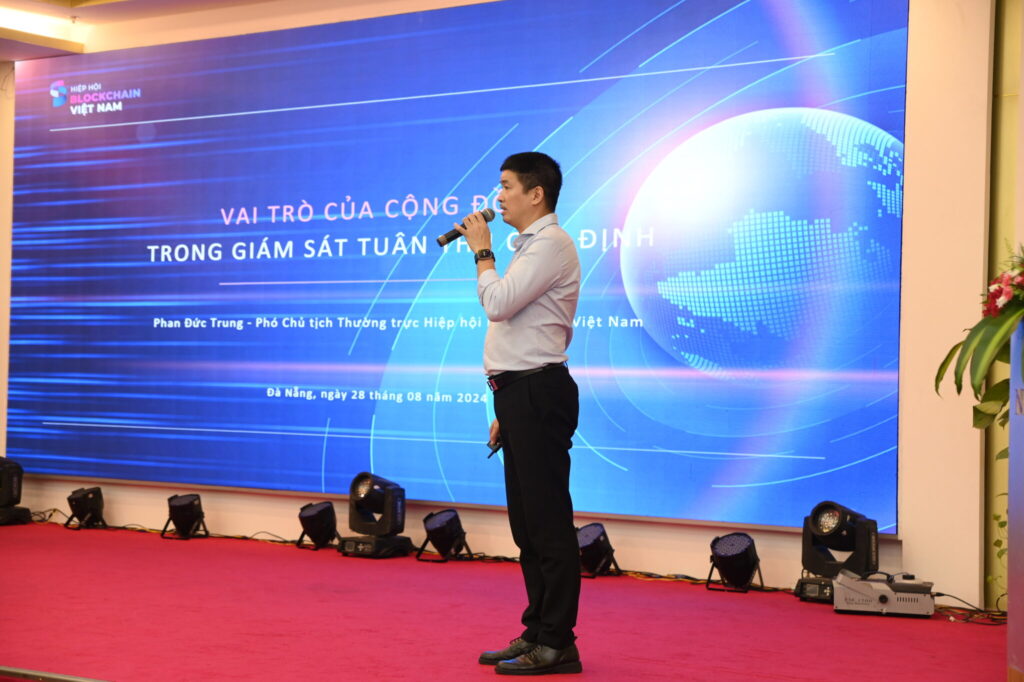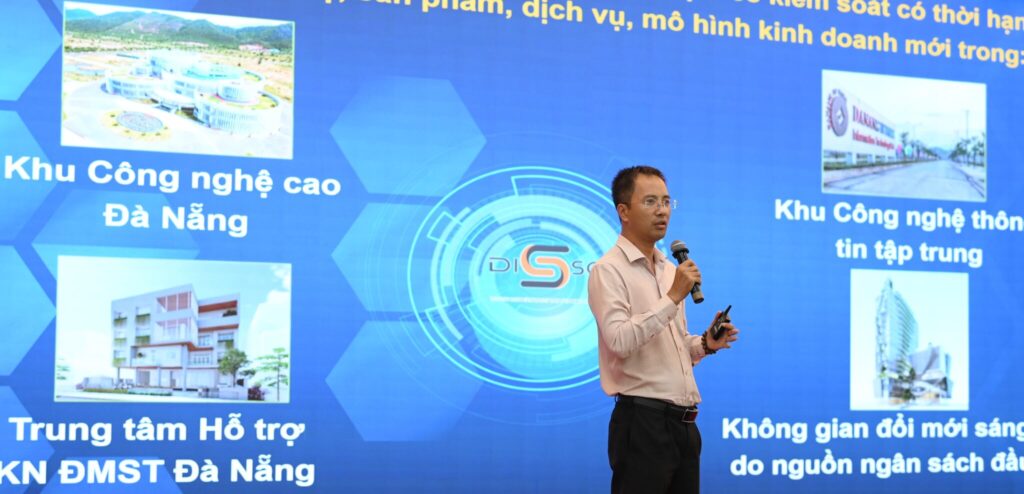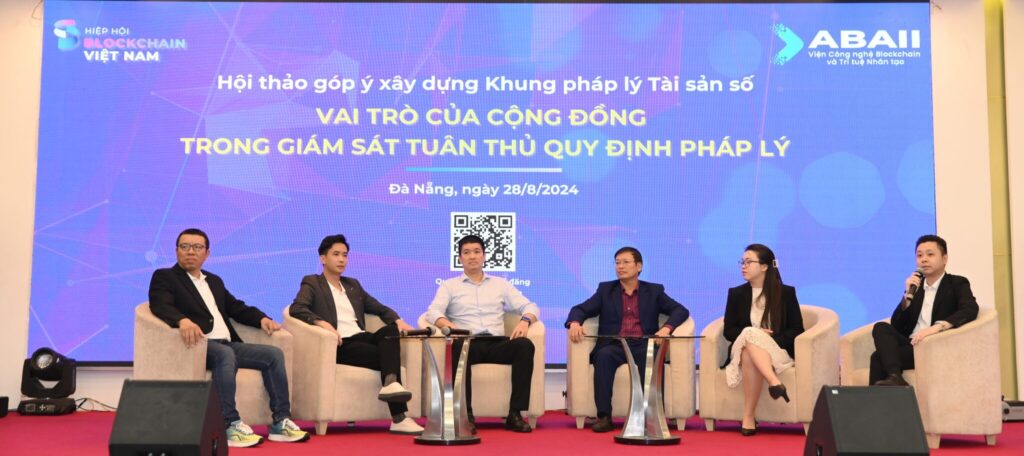“If legal regulations on digital assets ensure compliance, rigor, and protection of the interests of all participants, then ethical guidelines and community standards will help strengthen trust and promote the enforcement of legal regulations from within the community itself,” emphasized Mr. Phan Đức Trung, Vice Chairman of the Vietnam Blockchain Association.

According to Mr. Phan Đức Trung, ethical guidelines and community standards are important in any field, but especially crucial in areas that are in a gray zone and lack a comprehensive legal framework, such as digital assets. With characteristics like cross-border reach, 24/7 operation, and rapid liquidity, digital assets are often exploited for various fraudulent activities, asset theft, money laundering, and tax evasion. Therefore, soft principles developed by the community carry even greater significance in this context.
This information was shared at the 7th workshop on building a legal framework for digital assets, themed “The Role of the Community in Monitoring Compliance with Legal Regulations,” organized by the Vietnam Blockchain Association at the National Assembly Guest House in Da Nang on August 28, 2024. The program was attended by representatives from various government agencies in Da Nang, including the Department of Science and Technology, the Department of Information and Communications, the Da Nang Police, as well as associations and professional social organizations such as the Vietnam Chamber of Commerce and Industry (VCCI), the Da Nang Bar Association, the Da Nang Lawyers’ Union, the Vietnam Institute for Digital Economic Development, and the Ho Chi Minh National Academy of Politics, among others.
According to a report from the Atlantic Council, as of August 2024, 33 out of 60 surveyed countries (equivalent to 55%) have legalized digital assets. Among these, 12 economies (accounting for a total of 57% of global GDP) in the G20 have officially regulated digital assets. Only 10 out of 60 countries have imposed a complete ban, while 17 out of 60 have partially restricted this activity.
However, it is noteworthy that even in countries with a legal framework for digital assets, the rate of tax evasion and inaccurate reporting of digital asset and cryptocurrency transactions remains very high, ranging from 55% to 95%, according to a 2024 report from PwC. The reasons cited include unclear tax guidance, lack of information, and transactions conducted outside reporting obligations. This rate drops to 5% when information is provided by a third party.
In Vietnam, a report by Chainalysis indicates that cryptocurrency inflows have reached $120 billion per year, equivalent to nearly 30% of GDP, with 17.4% of the population owning cryptocurrencies, ranking seventh in the world. However, due to the lack of a legal framework to regulate this market, many adverse consequences have arisen, such as fraud, tax evasion, and illegal fundraising, causing serious losses for investors.
Several unlicensed digital asset exchanges are operating and promoting illegal services, reaching a wide range of users without any regulatory measures in place to protect users and collect taxes, such as BingX, MEXC, and Binance. Many entities with unclear information, such as CrossFi, Mineplex, and ALEO, are continuously holding private workshops, exploiting their image to attract funding from the community.
Some typical cases include the KardiaChain group, with several related legal entities such as KardiaChain Foundation, Kaitech Holding Ltd, and KardiaChain Blockchain Connection Joint Stock Company, which have been accused of embezzling approximately 71 million USD (equivalent to 500 million KAI tokens, based on the market price as of November 25, 2021) from 9 individuals and organizations, both domestic and international.
Due to the lack of legal binding, exchanges have failed to take appropriate actions to protect customer rights when incidents occur. For example, in the case of 100,000 USDT between a Vietnamese user and the MEXC exchange, when asked to cooperate in handling a fraud case through the exchange, MEXC required the customer to sign a Non-Disclosure Agreement (NDA) before continuing to provide support. However, to date, the user has still not received any assistance.
Similarly, the Gate.io exchange refused to cooperate in helping an investor recover 800,000 USDT that had been defrauded and transferred to this exchange. Previously, the victim had submitted a request for assistance to the ChainTracer transaction tracking program of the VBA for support. When the tracking program identified the funds flowing to Gate.io, the platform refused to assist the victim. Gate.io is also one of the exchanges directly warned by the State Securities Commission regarding its legal status.
According to Mr. Trung, the reason why these cryptocurrency exchanges refuse to cooperate and assist the victims is because “we are lacking both a legal framework and ethical standards and community guidelines. However, while a comprehensive legal framework inevitably lags behind real-life situations due to the time required for its development and enactment, ethical standards and community guidelines are powerful and swift tools to effectively address a portion of the current issues in the digital asset market.”
At this event, Mr. Võ Đức Anh, Deputy Director of the Da Nang Innovation and Startup Support Center, under the Da Nang Department of Science and Technology, shared Resolution 136/2024/QH15, which was passed by the 15th National Assembly during its 7th session on June 26, 2024. The resolution focuses on organizing urban governance, piloting special mechanisms, and policies to develop Da Nang City, prioritizing the attraction of investors, and promoting technology enterprises and innovation.

It includes provisions assigning Da Nang City the authority and responsibility to conduct controlled trials of new technological solutions (sandbox), along with various incentives and special support such as exemptions or preferential treatment regarding land lease policies, corporate income tax, and personal income tax for eligible businesses. This is seen as an excellent opportunity for new technology companies, such as those dealing with digital assets and real-world assets, to test new technologies and assess their impact before full-scale implementation.
The program was also attended by Dr. Trần Quý, Director of the Vietnam Institute for Digital Economy Development; Associate Professor Dr. Trần Mạnh Huy, Head of the Da Nang Representative Office of VBA, and Vice Director of the ABAII Institute; Dr. Võ Công Khôi, Senior Law Lecturer at the Ho Chi Minh National Academy of Politics; Ms. Lê Vũ Hương Quỳnh, Country Director of Vietnam, Tether; and Mr. Nguyễn Ngô Thế Công, Director of Asia-Pacific Development, Vinotech Group. They contributed valuable insights through their presentations and participated in lively and open discussions.

According to Ms. Lê Vũ Hương Quỳnh, Vietnam is in a unique position to lead and set global standards for digital asset regulations, making a positive impact and guiding trends with nearly 20 million digital asset owners and one of the highest adoption rates in the world. This creates a dynamic environment where the community plays a key role in shaping the market. Notably, “The inherent creativity of the Vietnamese people, demonstrated through their entrepreneurial spirit and innovative problem-solving approach, positions Vietnam as a potential leader in developing new compliance and regulatory models for digital assets,” Ms. Quỳnh shared.
From September 2023 to August 2024, the Vietnam Blockchain Association organized 7 workshops to contribute to the development of a Legal Framework for Digital Assets, with over 5,000 direct participants and representatives from more than 50 state agencies such as the National Assembly’s Committee on Science, Technology, and Environment, the Ministry of Finance, the State Bank of Vietnam, the Ministry of Information and Communications, the Ministry of Justice, the Government Cipher Committee, the Ministry of Public Security, the State Securities Commission, the National Assembly’s Legislative Institute, the Vietnam Banks Association, and the Vietnam Chamber of Commerce and Industry (VCCI), among others. Approximately 200 media outlets and television stations covered the event, with over 550 articles and television reports discussing the topics. Individuals and organizations involved also submitted more than 100 comments to help build a comprehensive legal framework for managing virtual assets, aligned with Vietnam’s current situation and global practices.
